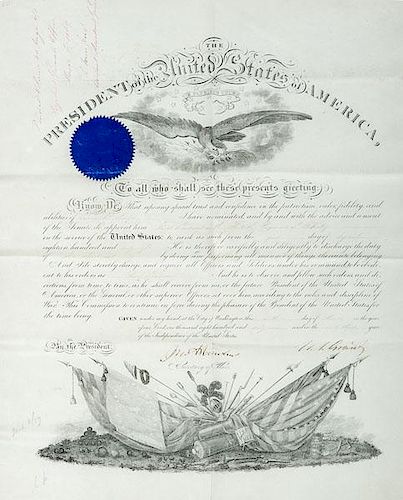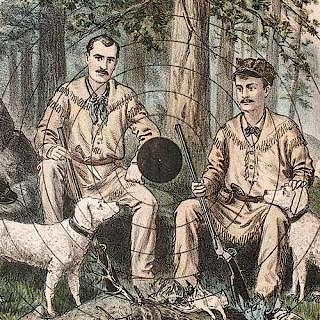Ulysses S. Grant Presidential Signed Commission for Lemuel B. Norton, 1st Lieutenant, 30th Regiment Infantry, March 1869
About Seller
6270 Este Ave.
Cincinnati , OH 45232
United States
With offices in Cincinnati, Cleveland and Denver, Cowan’s holds over 40 auctions each year, with annual sales exceeding $16M. We reach buyers around the globe, and take pride in our reputation for integrity, customer service and great results. A full-service house, Cowan’s Auctions specializes in Am...Read more
Two ways to bid:
- Leave a max absentee bid and the platform will bid on your behalf up to your maximum bid during the live auction.
- Bid live during the auction and your bids will be submitted real-time to the auctioneer.
Bid Increments
| Price | Bid Increment |
|---|---|
| $0 | $25 |
| $500 | $50 |
| $1,000 | $100 |
| $2,000 | $250 |
| $5,000 | $500 |
| $10,000 | $1,000 |
| $20,000 | $2,500 |
| $50,000 | $5,000 |
| $100,000 | $10,000 |
About Auction
Nov 20, 2015 - Nov 21, 2015
Cowan's Auctions dawnie@cowans.com
- Lot Description
Ulysses S. Grant Presidential Signed Commission for Lemuel B. Norton, 1st Lieutenant, 30th Regiment Infantry, March 1869
Lot of 2, including partially printed document signed by Ulysses S. Grant (1822-1885). 1p, 15 x 19 in. (sight), on vellum, with embossed seal affixed upper left. Washington, March 6, 1869. Appointment of Lemuel B. Norton as 1st Lieut. of the 30th U.S. Infantry. Signed by Grant as President (1869-1877) and John A. Rawlins (1831-1869) as Secretary of War (1869). Framed together with modern portrait of Grant and descriptive plaque, 31.5 x 27.5 in.
Accompanied by letter of transmission signed by Asst. Adj. Gen. J.C. Kelton, from the "War Department, Washington," March 22, 1869.
Lemuel B. Norton, Chief Signal Officer for the Army of the Potomac at Gettysburg
Lots 80-84
Warren County, PA native Lemuel B. Norton (1839-1871) enlisted on June 22, 1861 at the age of 21 as a 1st lieut. and was commissioned into Co. A of the 10th Infantry Regiment of the Pennsylvania State Guard and was later promoted to captain, but left that position when appointed by President Abraham Lincoln to the rank of captain in the Army of Potomac Signal Corps, a military organization pioneered by Maj. Albert J. Meyer. The new group utilized communication tactics and information as a weapon.
Norton served as Chief Signal Officer at the Battle of Gettysburg. He established a complicated line of men at important vantage points near Cemetery Hill, Powers Hill, Culp’s Hill and Little Round Top. He used them to communicate with other generals the positions and movements of enemy troops. His group on Little Round Top forced Longstreet to detour the approach march to his attack on July 2nd. Longstreet rerouted his march to a more concealed route, but failed. The Signal Corps warned Meade of their approach and reinforcements charged toward the flank that narrowly fought off the Confederates. In addition to his men, he had field telegraph trains he chose not to deploy.
Norton was recognized for "Gallant and Meritorious Service" in the Battle of Gettysburg, for "Meritorious Service" in the Signal Corps during the war, and for "Meritorious Service" in the Campaign against Richmond, VA. He continued his service after the war and ended his military career as a major in July 1867. Norton died in Philadelphia, PA, in December 1871 of pulmonary tuberculosis as a result of military exposure.
The papers, commissions, and personal effects offered here were previously passed down through members of Norton's family, and were sold in 1997 to a private collector.Both are good with typical folds and minor toning of the paper.Condition
- Shipping Info
-
SHIPPING. At the request of the buyer, Cowan's will authorize the shipment of purchased items. Shipments usually occur within two weeks after payment has been received. Shipment is generally made via UPS Ground service. Unless buyer gives special instructions, the shipping method shall be at the sole discretion of Cowan's Auctions, Inc.. Cowan's is in no way responsible for the acts or omissions of independent handlers, packers or shippers of purchased items or for any loss, damage or delay from the packing or shipping of any property.
-
- Buyer's Premium



 EUR
EUR CAD
CAD AUD
AUD GBP
GBP MXN
MXN HKD
HKD CNY
CNY MYR
MYR SEK
SEK SGD
SGD CHF
CHF THB
THB














